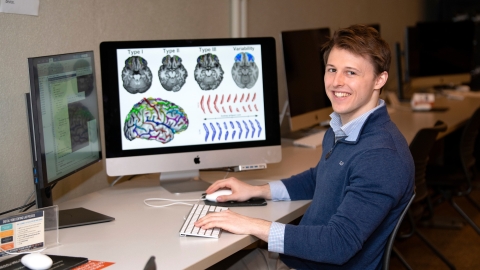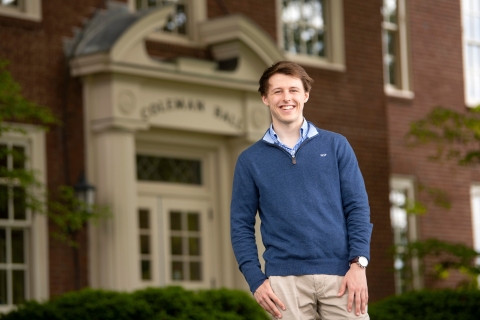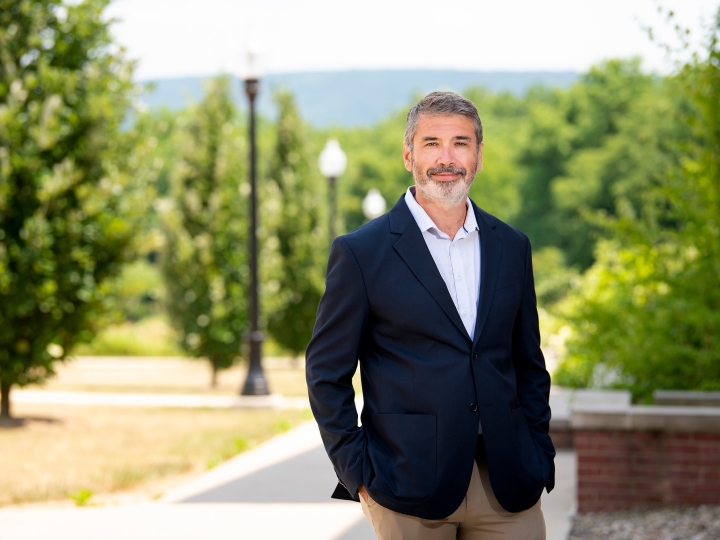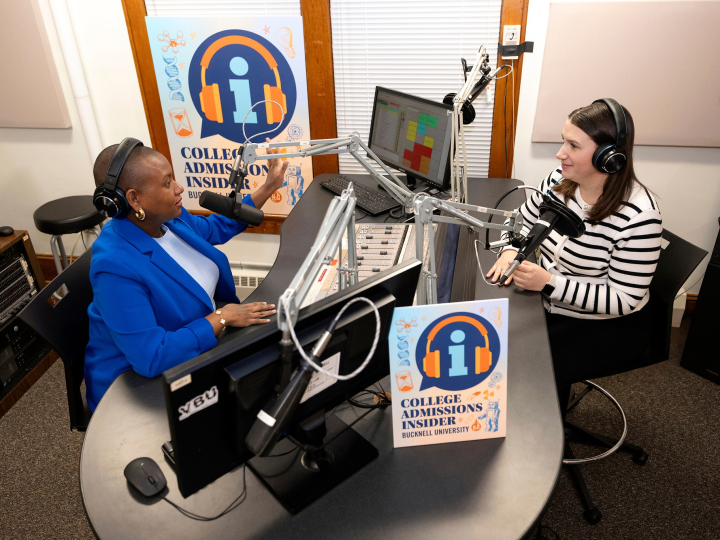
Advancing Clinical Creativity: Bucknell Neuroscience Major Receives Prestigious Gates Cambridge Scholarship
March 8, 2021
Since his first year at Bucknell, neuroscience major William Snyder '21 has put himself on the front line of research seeking to discover what structural patterns in the brain say about psychopathology.
Imagine the brain as a fingerprint, where the curves and ridges hold information about how it functions on a day-to-day basis. What if those specific structural details could predict someone's risk of developing psychological disorders like clinical depression, schizophrenia and bipolarity?
Since his first year at Bucknell, neuroscience major William Snyder '21 has put himself on the front line of research seeking to discover what structural patterns in the brain say about psychopathology. After Bucknell, he'll continue expanding those scientific boundaries at the University of Cambridge as a recipient of the 2021 Gates Cambridge Scholarship. Established by a $210 million donation from the Bill and Melinda Gates Foundation, the prestigious scholarship — awarded to only 25 U.S. applicants annually — provides full funding for the pursuit of a Ph.D. at the university.
It's an achievement that busts the doors of exploration wide open for Snyder, whose curiosity about the brain was sparked in high school when he began perusing public neuroimaging datasets online.
"A lot of the progress that's been made in neuroimaging has been due to being creative with these datasets — using novel analysis and applications of mathematics to extract information from the brain," he says. "That's what really drew me, that it provided an opportunity for creativity, especially when applied to science surrounding psychopathologies like autism."
When searching for an undergraduate college, the Severna Park, Md., native wasn't only looking for a stellar neuroscience program but also for the chance to advance clinical work in the field. Shortly after arriving at Bucknell, psychology professor Judith Grisel helped Snyder find his opportunity through the University's ties with the Geisinger Autism & Developmental Medicine Institute in Lewisburg, Pa., located just a five-minute drive from campus. Partnering with Dr. Vanessa Troiani, Snyder analyzed how consistent patterns in the brain folds of the orbitofrontal cortex — a region just above the eyes — may relate to the prevalence of autism, schizophrenia, bipolar disorder and more.

Will Snyder '21 credits the endless opportunities for personal and professional growth at Bucknell for forming the foundation of his success so far. Photo by Emily Paine, Communications
"You can actually take the measurements of the curvatures and folds and identify risk for multiple disorders," Snyder explains. "There's a push toward these transdiagnostic approaches where you're looking at brain data in a dimensional way: How can you relate individual brain features to a range of behaviors associated with varying disorders?"
Taking that question even further, can a person's predisposition be evaluated before they're born? Because most brain folds begin to form within the second and third trimesters of pregnancy, neuroscientists like Snyder suspect it's possible.
"It's a discovery that could potentially have a powerful impact on clinical research and health care," he says. "In the middle of investigating all of these questions, I had this thought that I would never work a day in my life if I were lucky enough to continue with this kind of study."
It wasn't luck so much as passion, earnest work and supportive mentorship within Bucknell's undergraduate research programs that secured Snyder the Gates Cambridge Scholarship. With access to vast and robust neuroscience databases like Cambridge's NeuroScience in Psychiatry Network, he hopes to take an even deeper look at brain development throughout adolescence in relation to psychopathology. In combination with mathematics applications like graph theory, connections between brain folding and brain function could "boost explanatory power as far as predicting disorder at an early age," Snyder says.
As he looks forward to his journey post-Bucknell, Snyder credits the endless opportunities for personal and professional growth — from gaining early confidence as a hands-on researcher to becoming a 2019 Goldwater Scholar to guiding groups on outdoor adventures as a BuckWild leader — for forming the foundation of his success so far.
"It's really an honor to be part of this cohort of recipients. It's such a big reflection on how Bucknell produces leaders and on the community that helped me get to this point," he says. "I want to make sure that I do as much as I can with it."

